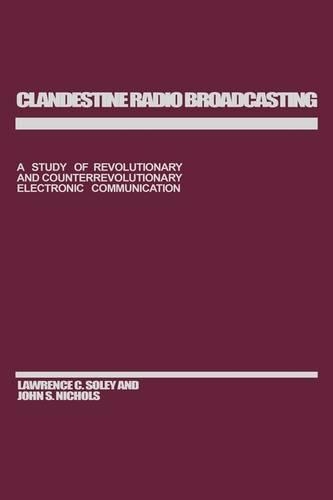
Clandestine Radio Broadcasting: A Study of Revolutionary and Counterrevolutionary Electronic Communication
(Hardback)
Publishing Details
Clandestine Radio Broadcasting: A Study of Revolutionary and Counterrevolutionary Electronic Communication
By (Author) John Nichols
By (author) Lawrence C. Soley
Bloomsbury Publishing PLC
Praeger Publishers Inc
8th December 1986
United States
Classifications
Tertiary Education
Non Fiction
303.375
Physical Properties
Hardback
400
Width 152mm, Height 229mm
794g
Description
It is difficult to imagine a subject with more elusive data than this. The source and location of clandestine radio broadcasts are, by definition, secret. `White' stations openly identify themselves (such as Radio Free Europe), and `gray' stations are purportedly operated by dissident groups within a country, although actually they might be located in another nation; but `black' stations transmit broadcasts by one side disguised as broadcasts by another. . . . [This] is an extraordinary book. It belongs in every research library concerned with war and revolution and international communications. A valuable appendix lists known clandestine radio stateions, 1948-1985. Choice In this ambitious and impressive study two academic specialists in the field of political communication have endeavored to cover the history of such broadcasts from the beginnings in the 1930s through the use of psychological warfare and deception of World War II to the manifold practice of `gray' and `black' propaganda that had punctuated the conflict of the postwar period. Foreign Affairs
Reviews
"It is difficult to imagine a subject with more elusive data than this. The source and location of clandestine radio broadcasts are, by definition, secret. White' stations openly identify themselves (such as Radio Free Europe), and gray' stations are purportedly operated by dissident groups within a country, although actually they might be located in another nation; but black' stations transmit broadcasts by one side disguised as broadcasts by another. Clandestine stations often operate for only days or weeks on an erratic schedule and on various frequencies. ... [This] is an extraordinary book. It belongs in every research library concerned with war and revolution and international communications. A valuable appendix lists known clandestine radio stations, 1948-1985."-Choice
In this ambitious and impressive study two academic specialists in the field of political communication have endeavored to cover the history of such broadcasts from the beginnings in the 1930s through the use of psychological warfare and deception in World War II to the manifold practice of gray' and black' propaganda that had punctuated the conflicts of the postwar period.-Foreign Affairs
It is difficult to imagine a subject with more elusive data than this. The source and location of clandestine radio broadcasts are, by definition, secret. White' stations openly identify themselves (such as Radio Free Europe), and gray' stations are purportedly operated by dissident groups within a country, although actually they might be located in another nation; but black' stations transmit broadcasts by one side disguised as broadcasts by another. Clandestine stations often operate for only days or weeks on an erratic schedule and on various frequencies. ... [This] is an extraordinary book. It belongs in every research library concerned with war and revolution and international communications. A valuable appendix lists known clandestine radio stations, 1948-1985.-Choice
"In this ambitious and impressive study two academic specialists in the field of political communication have endeavored to cover the history of such broadcasts from the beginnings in the 1930s through the use of psychological warfare and deception in World War II to the manifold practice of gray' and black' propaganda that had punctuated the conflicts of the postwar period."-Foreign Affairs
Author Bio
LAWRENCE C. SOLEY is Professor of Journalism at the University of Minnesota. He is the author of Clandestine Radio Broadcasting (Praeger, 1986) and Radio Warfare (Praeger, 1989), as well as numerous articles on political communication.
